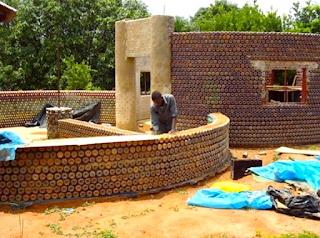Recycla-cools?
Something I bang on about a lot is recycling. I do it here, I do in real life, hell I do it at work too! It may only be a small step in reducing plastic pollution, but it is an easy step everyone can take. And should take, honestly.
But what happens to our household waste when it is recycled?
I've seen pencils made from recycled plastics, and certain products do promote the fact they are made from recycled goods. But what else happens to them?
So I went digging on the internet. I have found three cool initiatives that I wanted to share with you all.
Bottle Bricks
 |
| Photo from Natural Building Blog |
Bottle bricks are where empty (waste) plastic bottles are packed with sand or other non-recyclable plastics, rendering them a strong building resource. They are being used to build houses, schools, or even just benches! They are a versitile building block and made from an all too readily available material. A number of projects using this new style of brick are happening across the world, from the US to Africa.
I like this project because it shows that our “waste” does not necessarily have only one destination after use - the bin. It’s this sort of outside the box thinking which we need more of in this world.
Nappies --> Diesel
I like this project because it shows that our “waste” does not necessarily have only one destination after use - the bin. It’s this sort of outside the box thinking which we need more of in this world.
Nappies --> Diesel
 |
| Photo from SlidePlayer |
So babies poop, a lot. They get through a looooottttt of nappies. And most of those nappies end up in landfill. There are re-usable options, but they are not widely used. Dispoable nappies are convenient, cheap, and claim to keep babies comfy and dry. But they are used once, thrown away and make up a percentage of plastic pollution.
In Quebec, Canada, there is a company which is turning poopy nappies into fuel. Using a process called pyrolysis, which is decomposing matter with heat, they break the nappies down to convert them into usable fuel. They can convert 30,000 tons of nappies into 11,000 tons of diesel. It is a closed system so it creates no emissions. It has the potential to be very economically viable as the process improves.
I think this is an interesting initiative and certainly a better use of dirty nappies than them festering in landfills.
Precious Plastic
 |
| Photo from Precious Plastic's YouTube |
Do not be misled by the name, Precious Plastic. This is a global community which are recyling plastics and turning them into sellable items. They are currently on their third initiative and are gearing up for their fourth. Currently, they have shipping containers worldwide with all the equipment needed to recycle donated plastic into a number of items. Everything from decorative tiles to construction equipment.
No seriously, everything.
The items are for sale online from the various businesses they support in the community. They encourage you to shop local, but do offer worldwide shipping.
This seems really interesting and I am looking forward investigating a little further, and hopefully get involved if I can.
Do you know of any interesting recycling intiatives? Let me know about your recycla-cools. (Reckon I can get that to take off? XD)



Comments
Post a Comment